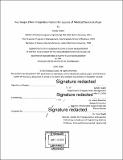Key supply chain integration factors for success of medical device startups
Author(s)
Gupta, Sanjay, M. Eng. Massachusetts Institute of Technology
DownloadFull printable version (8.776Mb)
Other Contributors
Massachusetts Institute of Technology. Supply Chain Management Program.
Advisor
Alexis Bateman.
Terms of use
Metadata
Show full item recordAbstract
Healthcare cost are on the rise and becoming a major concern in the US economy. In fact, healthcare spending is the largest individual contributor to US gross domestic product. Various stakeholders such as government, insurance and payors are now looking at the healthcare providers and manufacturers to come up with innovative and cost-effective solutions. Medical device manufacturers rely heavily on startups to provide new technology solutions to market. Yet, survival rate of these startups is very low. Various factors contribute to the success of these startups such as: market scope, financial support, supply chain integration, patent protection, regulatory compliance, founders experience and more. This thesis investigates supply chain integration factors contributing to the success of medical device startups. Sixteen key supply chain integration factors were identified using systematic literature review and interview research methodology. A survey was conducted to a range of industry participants to validate these factors. Survey responses were then analyzed and validated using statistical application SAS JIMP. Most of the factors stem from regulatory requirements as laid down by U.S. Food and Drug Administration. Out of sixteen factors, Quality management system, good manufacturing practice and collaboration with suppliers and distributors were identified as most critical to the success of medical device startups. These supply chain integration factors were further categorized under three major categories namely compliance, cost and collaboration. A medical device startup need to manage simultaneously all supply chain integration factors under these three categories. The findings of the research would be useful to medical device startups to bring lifesaving innovative solutions in market and contribute to success of these startups.
Description
Thesis: M. Eng. in Supply Chain Management, Massachusetts Institute of Technology, Supply Chain Management Program, 2018. Cataloged from PDF version of thesis. Includes bibliographical references (pages 60-62).
Date issued
2018Department
Massachusetts Institute of Technology. Supply Chain Management ProgramPublisher
Massachusetts Institute of Technology
Keywords
Supply Chain Management Program.